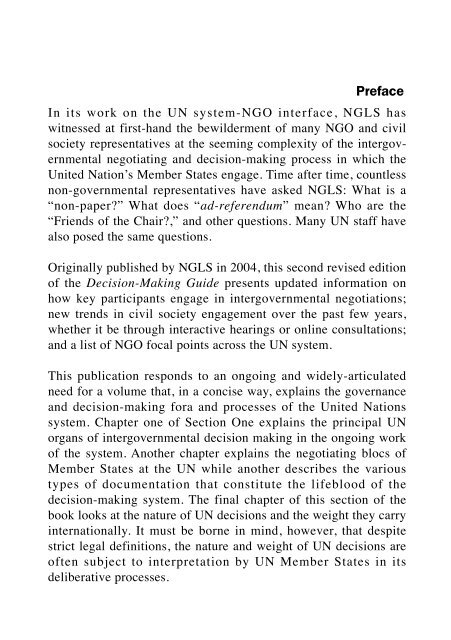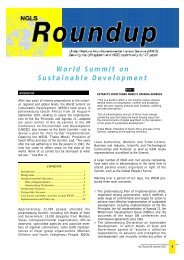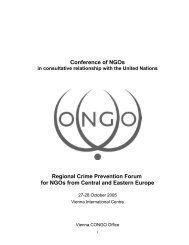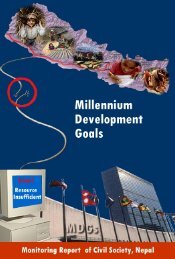Intergovernmental Negotiations And Decision Making At The - NGLS
Intergovernmental Negotiations And Decision Making At The - NGLS
Intergovernmental Negotiations And Decision Making At The - NGLS
- No tags were found...
Create successful ePaper yourself
Turn your PDF publications into a flip-book with our unique Google optimized e-Paper software.
PrefaceIn its work on the UN system-NGO interface, <strong>NGLS</strong> haswitnessed at first-hand the bewilderment of many NGO and civilsociety representatives at the seeming complexity of the intergovernmentalnegotiating and decision-making process in which theUnited Nation’s Member States engage. Time after time, countlessnon-governmental representatives have asked <strong>NGLS</strong>: What is a“non-paper?” What does “ad-referendum” mean? Who are the“Friends of the Chair?,” and other questions. Many UN staff havealso posed the same questions.Originally published by <strong>NGLS</strong> in 2004, this second revised editionof the <strong>Decision</strong>-<strong>Making</strong> Guide presents updated information onhow key participants engage in intergovernmental negotiations;new trends in civil society engagement over the past few years,whether it be through interactive hearings or online consultations;and a list of NGO focal points across the UN system.This publication responds to an ongoing and widely-articulatedneed for a volume that, in a concise way, explains the governanceand decision-making fora and processes of the United Nationssystem. Chapter one of Section One explains the principal UNorgans of intergovernmental decision making in the ongoing workof the system. Another chapter explains the negotiating blocs ofMember States at the UN while another describes the varioustypes of documentation that constitute the lifeblood of thedecision-making system. <strong>The</strong> final chapter of this section of thebook looks at the nature of UN decisions and the weight they carryinternationally. It must be borne in mind, however, that despitestrict legal definitions, the nature and weight of UN decisions areoften subject to interpretation by UN Member States in itsdeliberative processes.
















